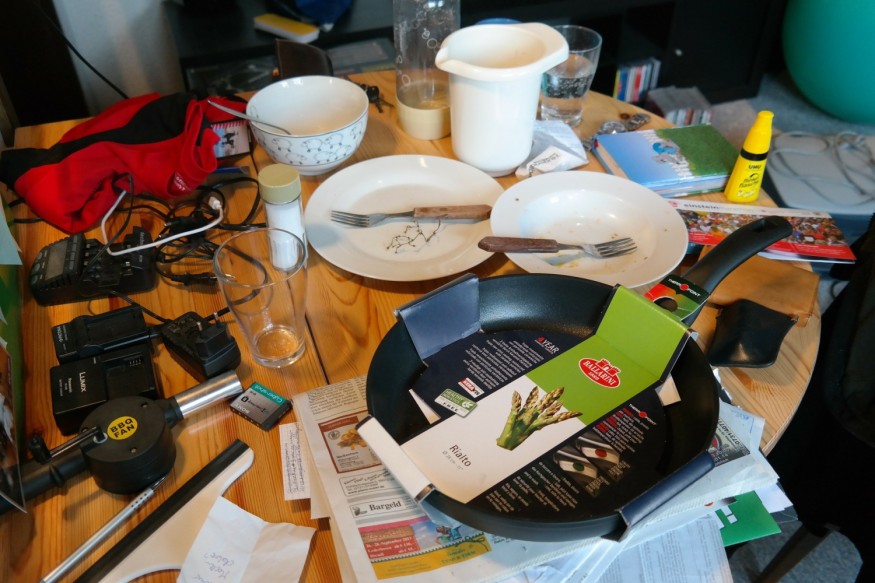
What does a cluttered desk say about you? Depending on what you read or where you look, there are opposing answers to this seemingly simple question. Most, however, usually fall into one of two camps. A cluttered desk means you are a messy genius expressing healthy cognition, or you're unorganized and your mess hurts your production and causes undue stress.
So, does the current state of your desk depict a creative mind or stressful situation?
For those wanting a difinative answer about whether or not clutter is a good thing, the answer is an ardent and unwavering-maybe. It really depends on the level of clutter. Some controlled clutter has been tied to creativity and improved production, while extreme clutter is seen as detrimental to both your physical and mental health.
Negative Effects of Clutter
In cases of extreme clutter-where a desk is covered in piles of paper, food, and miscellaneous knickknacks to the point of having to shuffle around to actually find a place to work-research shows such excess stimulation takes attention off work, causing an overall loss in productivity.
In fact, those shown to multitask and retain focus in this type of work environment are the exception. In most cases, it's the complete opposite. A 2009 study performed at Stanford University shows the brain really isn't great at trying to focus on multiple things at once. And a study published in Current Psychology shows a link between procrastination and clutter. In some cases, multitasking was shown to have a negative impact on mental health digest, by releasing increased levels of the stress hormone cortisol.
From this perspective, extensive clutter and disorganization makes it harder for you to focus. Because the brain is wired to keep track of only a few details at one time, and for only a short period, the chance of overload can impact working memory.
Clutter and Creativity
On the other side of this coin is the thought that people who are more disorganized tend to be more creative. And, yes, there is research that backs this up. For some, a clean desk may help reduce stress at work and increase productivity. But for others, working with a limited amount of clutter feels comfortable.
Those who work at a messier, somewhat cluttered desk have been shown to be more creative and able to develop innovative ideas. And a study performed at the University of Minnesota shows people who work in clutter are just as productive as those who don't.
The Productivity Perception
The general perception is that clutter either does, or will end up hurting productivity. In one workplace study, a number of manager-level bosses admitted a cluttered, unkempt workspace may keep them from offering promotions to staff members, as there's a certain amount of judgement in the workplace.
While cluttered desk research is somewhat mixed-largely dependent on the level of clutter-what's most important is figuring out what works best for you personally. If you work best in controlled chaos, that's totally fine, as long as it doesn't hurt your productivity. But if you tend to get distracted by your worspace clutter, it may be time for a little clean up.
With a couple changes to your workflow, keeping an organized desk can be pretty simple:
● Add daily desk cleaning to your to-do list. Making this your last task of the day, every day, allows you to leave work knowing everything is wrapped up neatly and nothing has fallen through the cracks. Plus, you won't have to deal with a mess the next day.
● When possible, lose the paper. Keeping documents and files on your computer means less paper for your desk.
● Have a designated paper space. Limiting the amount of space you allow for paper on your desk will leave you no choice but to keep things organized. And if each type of document has its place, you'll find things easier than if you just add to the top of the pile.
Whether you define yourself as a messy genious, unorganized mess, or even a total neat freak, only you know which type of workspace is best for you. Take time to evaluate when you feel stressed. Is the source your current environment, workload, coworkers, or stemming from issues outside of work? As you get clarity and understand what stresses are related to the space around you, step up and make changes. And remember, small steps can bring huge rewards.
-
About the Writer
Scott Pack is a health and lifestyle communicator for USANA Health Sciences. He holds bachelor and master's degrees in English from Weber State University. When he isn't typing the day away, he can be found on a trail somewhere along the Wasatch Front with his wife, daughter, and labradoodle, Scout.
© 2026 ScienceTimes.com All rights reserved. Do not reproduce without permission. The window to the world of Science Times.









